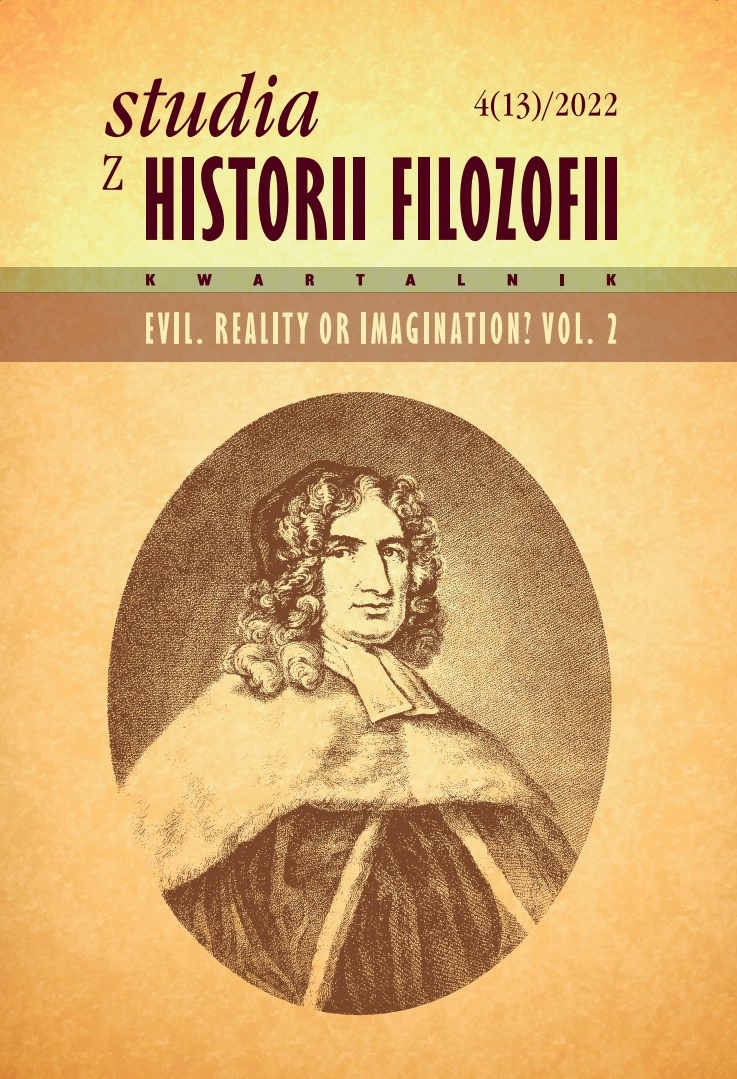The Historiography of Philosophy in Antiquity
Part I: From the Earliest Sources to Plato
DOI:
https://doi.org/10.12775/szhf.2022.022Keywords
historiography of philosophy, ancient sources, doxography, Plato, sophistsAbstract
The intention of this article is to sketch the ancient authors' approach to historiography of philosophy (or rather, to the ancient equivalents of that discipline) and to discuss the ways in which it was practiced by them. The first part deals with the sources that have survived to the present day. The writings that had the greatest chance of survival were those that were in constant demand – especially those whose authors were the founders of the most important schools, such as Plato and Aristotle. The replacement of papyrus scrolls with a new, more durable type of medium, the codex, was also of significance. The activities of the sophists – in particular Gorgias of Leontinoi and Hippias of Elis – who were probably the first to begin collecting the views of various thinkers, are discussed next. In doing so, the motives and principles according to which the sophists arranged these works are considered. The article closes with an analysis of excerpts from Plato's writings, in which one can perhaps see traces of the use of this kind of compilations.
References
Aristotle. 1955. Minor Works, przeł. Walter S. Hett. London–Cambridge (Massachusetts): William Heinemann, Harvard University Press.
Aristotle. 1955. On Sophistical Refutations. On Coming-to-be and Passing-Away. On the Cosmos, przeł. Edward S. Forster, David J. Furley. London–Cambridge (Massachusetts): William Heinemann, Harvard University Press.
Arystoteles. 1984. Metafizyka, przeł. Kazimierz Leśniak. Warszawa: PWN.
Athenaeus. 2006. The Learned Banqueters. Books III.106e-V, przeł. Douglas S. Olson. Cambridge–London: Harvard University Press.
Bailey Cyril. 1926. Epicurus: The Extant Remains. Oxford: Oxford University Press.
Barnes Jonathan. 1995. „Life and Work”. W: The Cambridge Companion to Aristotle, red. Jonathan Barnes, 1–26. Cambridge: Cambridge University Press.
Bénatouïl Thomas. 2006. „Philosophic Schools in Hellenistic and Roman Times”. W: A Companion to Ancient Philosophy, red. Mary L. Gill, Pierre Pellegrin, 415–429. Oxford: Blackwell Publishing.
Betegh Gábor. 2010. „The Transmission of Ancient Wisdom: Texts, Doxographies, Libraries”. W: The Cambridge History of Philosophy in Late Antiquity, red. Lloyd P. Gerson, t. 1, 25–39. Cambridge: Cambridge University Press.
Bugh Glenn R. 1992. „Athenion and Aristion of Athens”. Phoenix 46: 108–123.
Cornford Francis M. 1957. Plato’s Theory of Knowledge. New York: Liberal Arts Press.
De Haas Frans A. J. 2003. „Late Ancient Philosophy”. W: The Cambridge Companion to Greek and Roman Philosophy, red. David Sedley, 242–270. Cambridge: Cambridge University Press.
Diels Hermann, Walther Kranz. 1959–1960. Die Fragmente der Vorsokratiker, t. 1–3. Berlin: Weidmannsche Verlagsbuchhandlung.
Diogenes Laertios. 1984. Żywoty i poglądy słynnych filozofów, przeł. Irena Krońska. Warszawa: PWN.
Domaradzki Mikołaj. 2013. Filozofia antyczna wobec problemu interpretacji. Rozwój alegorezy od przedsokratyków do Arystotelesa. Poznań: Wydawnictwo Naukowe Instytutu Filozofii UAM.
Dorandi Tiziano. 1999. „Chronology”. W: The Cambridge History of Hellenistic Philosophy, red. Keimpe Algra, Jonathan Barnes, Jaap Mansfeld, Malcolm Schofield, 31–54. Cambridge: Cambridge University Press.
Epiktet. 1961. Diatryby, Encheiridion: z dodaniem Fragmentów oraz Gnomologium Epiktetowego, przeł. Leon Joachimowicz. Warszawa: PWN.
Gajda Janina. 1989. Sofiści. Warszawa: Wiedza Powszechna.
Gajda-Krynicka Janina. 2007. Filozofia przedplatońska. Warszawa: PWN.
Isocrates. 1929. Isocrates with an English Translation in Three Volumes, przeł. George Norlin, t. 2. London–New York: William Heinemann, G. P. Putnam’s Sons.
Kerferd George B. 1981. The Sophistic Movement. Cambridge: Cambridge University Press.
Kleantes. 1946. „Hymn do Zeusa”, przeł. Maria Maykowska. Meander 1: 526–527.
Klemens Aleksandryjski. 1994. Kobierce zapisków filozoficznych dotyczących prawdziwej wiedzy, przeł. Janina Niemirska-Pliszczyńska, t. 2. Warszawa: Instytut Wydawniczy Pax.
Ksenofont. 1967. Pisma sokratyczne, przeł. Leon Joachimowicz. Warszawa: PWN.
Kulig Katarzyna. 2005. „Papirus z Derveni (przekład)”. Studia Antyczne i Mediewistyczne 3: 5–17.
Lukrecjusz. 1957. O naturze wszechrzeczy, przeł. Edward Szymański. Warszawa: PWN.
Mansfeld Jaap. 1990. Studies in the Historiography of Greek Philosophy. Assen–Maastricht: Van Gorcum.
Mansfeld Jaap. 1999. „Sources”. W: The Cambridge History of Hellenistic Philosophy, red. Keimpe Algra, Jonathan Barnes, Jaap Mansfeld, Malcolm Schofield, 1–30. Cambridge: Cambridge University Press.
Mejer Jørgen. 2006. „Ancient Philosophy and the Doxographical Tradition”. W: A Companion to Ancient Philosophy, red. Mary L. Gill, Pierre Pellegrin, 20–33. Oxford: Blackwell Publishing.
Platon. 1990. Kratylos, przeł. Witold Stefański. Wrocław: PAN.
Platon. 1997. Prawa, przeł. Maria Maykowska. Warszawa: Wydawnictwo ALFA.
Platon. 2002. Parmenides. Teajtet, przeł. Władysław Witwicki. Kęty: Wydawnictwo ANTYK.
Platon. 2002. Sofista. Polityk, przeł. Władysław Witwicki. Kęty: Wydawnictwo ANTYK.
Platon. 2003. Państwo, przeł. Władysław Witwicki. Kęty: Wydawnictwo ANTYK.
Platon. 2004. Protagoras, przeł. Leopold Regner. Warszawa: Wydawnictwo Naukowe PWN.
Platon. 2012. Dialogi, przeł. Władysław Witwicki. Warszawa: Unia Wydawnicza „Verum”.
Plotyn. 1959. Enneady, przeł. Adam Krokiewicz, t. 1–2. Warszawa: PWN.
Plutarch. 2003. Cztery żywoty, przeł. Mieczysław Brożek. Warszawa: Czytelnik.
Powell Jonathan G. F. 2013. „The Embassy of the Three Philosophers to Rome in 155 BC”. W: Hellenistic Oratory: Continuity and Change, red. Christos Kremmydas, Kathryn Tempest, 219–247. Oxford: Oxford University Press.
Reale Giovanni. 2005. Historia filozofii starożytnej, przeł. Edward I. Zieliński, t. 5: Słownik, indeksy, bibliografia. Lublin: Wydawnictwo KUL.
Sedley David. 2003. „Philodemus and the Decentralisation of Philosophy”. Cronache Ercolanesi 33: 31–41.
Sekstus Empiryk. 1970. Przeciw logikom, przeł. Izydora Dąmbska. Warszawa: PWN.
Sekstus Empiryk. 2019. Zarysy Pyrrońskie, przeł. Zbigniew Nerczuk. Toruń: Wydawnictwo Naukowe UMK.
Seneka. 1965–1969. Pisma filozoficzne, przeł. Leon Joachimowicz, t. 1–3. Warszawa: Instytut Wydawniczy Pax.
Snell Bruno. 1944. „Die Nachrichten über die Lehren des Thales und die Anfänge der griechischen Philosophie- und Literaturgeschichte”. Philologus 96: 170–182.
Strabo. 2014. The Geography of Strabo, przeł. Duane W. Roller. Cambridge: Cambridge University Press.
Tarrant Harold. 1993. Thrasyllan Platonism. Ithaca–London: Cornell University Press.
Downloads
Published
How to Cite
Issue
Section
License

This work is licensed under a Creative Commons Attribution-NoDerivatives 4.0 International License.
Stats
Number of views and downloads: 1145
Number of citations: 0



